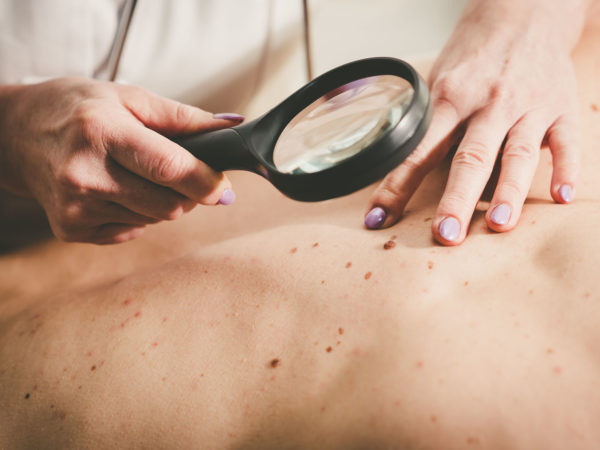What’s The Difference Between A Freckle And A Mole?
I’ve always had a lot of freckles. Should I be concerned about skin cancer?
Andrew Weil, M.D. | April 21, 2022

Freckles are almost always a harmless reaction to sun exposure, so you probably don’t need to be concerned about a freckle becoming cancerous. However, people who have a history of freckles are often very light-skinned and prone to sunburn, which can indeed increase your risk of developing skin cancer. So, the more complete answer is that you probably should be concerned about skin cancer – not because you have freckles, but because if you have freckles, you probably have light skin. It’s not your freckles that you should be paying attention to, but your moles.
Freckles and moles are both small areas of excess pigmentation in the skin, but they are actually quite different. Sunlight can bring out freckles in those with a genetic predisposition. (Those particular freckles are called ephelides.) Sunlight can also cause spots that look like freckles in those without a family history but who spend a lifetime in the sun. (Those are called lentigines, or “age spots.”)
It is interesting to note that no matter what their genetics, newborns never have freckles – the spots generally start to appear after age two or three, when a child has had enough sun exposure to induce freckling. They generally appear on the face, back, arms, and legs. Freckles can multiply and darken in the sun, then fade during winter.
Moles are overgrowths of skin cells called melanocytes. They tend to be raised, whereas freckles are flat, which is one way to tell the difference. Like freckles, moles can develop or change with sun exposure, but they also respond to the hormonal fluctuations that occur during puberty and pregnancy. They are very common, and not usually dangerous, but in certain cases they can be signs of skin cancer. A mole (medically called a nevus) can change shape or become itchy or even bleed – all signs that it needs medical attention.
Sunlight is often the culprit in a benign mole developing into skin cancer, but there is also a genetic component – those with a family history of skin cancer are at higher risk for developing it themselves. If you are prone to sunburn and have light skin and freckles, you should be diligent about having regular skin checkups. Skin cancer is extremely curable when caught early.
Andrew Weil, M.D.
Sources:
Praetorius C, Sturm RA, Steingrimsson E. Sun-induced freckling: ephelides and solar lentigines. Pigment Cell Melanoma Res. 2014 May;27(3):339-50. doi: 10.1111/pcmr.12232. Epub 2014 Mar 3. PMID: 24517859. https://pubmed.ncbi.nlm.nih.gov/24517859/












